大学英语四级听力长对话的3个答题技巧
大学英语四级听力题型题型及答题技巧

大学英语四级听力题型题型及答题技巧听力部分的分值在四级考试中占35%,录音播放时间在35分钟左右。
如何在这“惊心动魄”的半小时中,有效把握信息点,是很多考生颇为头疼的问题。
下面是由给大家带来的大学英语四级听力题型分析及答题技巧,一起来看看吧!大学英语四级听力题型分析一、新闻题。
新闻题的特点是原文会开门见山交待发生的事情。
而往往新闻题的第一道题考的也是新闻主旨,所以新闻题的开头部分很重要。
后面通常是围绕新闻主旨进行细节描述,那么后一道或者后两道会出在细节上。
另外熟悉新闻常用词也是必要的。
当然具体到每道题的方法还会有各自特点,下面做逐题分析1新闻第一题在开头部分找答案,本题从开头部分通过视听一致即可确定,预览选项先划出选项中的重点词,因为A/B/D三项均没有听到其中的重点词,只有C项中dangerous明显听到。
2 预览此题为短词选项,短词选项通常符合视听一致,但难点是容易出现干扰项。
但窍门在于如果出现没听懂却只听到选项其中两个词的情况,历年考试规律是选后者正确概率大得多。
不过,本题没有出现干扰项,所以很简单属于送分题。
3 第二篇新闻题是事故类新闻,这类新闻更是会开头交待出时间人物地点事件。
这篇新闻题第一题仍然是问发生的什么事情,考生抓住开头介绍,视听一致确定答案。
4抓住关键词: so that ,关键词加视听一致即可。
5 第三个新闻题第一题仍旧考题出在新闻主旨上,同样的方法,简单预览选项,文章开头第一句视听一致。
6本题是细节题。
考生应该注意的是新闻题中遇到“目击证人说/有关部门说/相关研究人员说”这类句子要认真听,此处容易出题。
本题,原文中announce(宣称)后视听一致确定答案。
7同样新闻题中出现时效性的分析或者预测都会是考点,所以诸如某人predict/estimate/ assess/confirm这样的句子时认真听,本题he estimated that…后面视听一致很容易听到lose jobs,本题无干扰项,容易确定答案。
英语四级听力长对话与短文解析与答题技巧

英语四级听力长对话与短文解析与答题技巧英语四级听力考试中,长对话和短文是必考的题型之一。
掌握解析长对话和短文的技巧对于提高听力成绩至关重要。
本文将详细介绍长对话和短文的解析方法,并提供一些答题技巧,以帮助大家更好地应对这两种题型。
一、长对话解析长对话主要考察对话中的细节理解以及推理能力。
在解析长对话时,可以按照以下步骤进行:1. 抓住对话主题:在听长对话之前,先快速阅读题目,抓住对话的主题,帮助你更好地理解对话内容。
2. 注意人物关系:对话中的人物关系对于理解对话内容非常重要,可以根据人物关系推测对话内容。
3. 留意关键词:在对话中留意出现频率较高的关键词,这些词汇往往会在答案中出现。
4. 注意修辞手法:有时对话中会使用修辞手法,如比喻、反问等,要注意理解修辞手法的含义,帮助你理解对话。
5. 推理能力:根据对话中的信息进行推理,找出暗示的答案。
二、短文解析短文主要考察细节理解和判断能力。
在解析短文时,可以按照以下步骤进行:1. 抓住短文主题:在听短文之前,先快速阅读题目,抓住短文的主题,帮助你更好地理解短文内容。
2. 注意关键词:在短文中留意出现频率较高的关键词,这些词汇往往会在答案中出现。
3. 排除干扰项:有些选项可能是干扰项,与短文内容没有直接关系,要学会排除这些选项。
4. 注意转折词:短文中常常会出现一些转折词,如but、however等,要注意这些转折词的出现,帮助你理解短文的逻辑。
5. 推理能力:根据短文中的信息进行推理,找出暗示的答案。
三、答题技巧除了掌握解析长对话和短文的方法外,还可以利用以下答题技巧来提高答题准确率:1. 预测答案:在听完问题之后,可以提前预测答案,然后在选项中找到与预测答案意思相近的选项。
2. 多听几遍:短时间内多听几遍长对话或短文,可以帮助你更好地理解内容,提高答题准确率。
3. 多做练习:通过做大量的长对话和短文练习,熟悉题型和常见的表达方式,提高答题技巧和速度。
四级听力长对话技巧【可编辑全文】

以下总结家庭日常生活类话题经常出现的句子/ 句 型:
What form of transport do you prefer to use? What are your opinions about traffic problems? There is a problem with ... I am sorry about this inconvenience. How can we afford to buy ...? We can pay a little on ... I’ve been told you might have a vacant room. Do you want to share with any roommates or live
以下总结休闲时光类话题经常出现的句子/ 句型: I am packed and ready to leave. I can’t remember which bag it’s in. I have planned to ... I can give you a 10% discount. I’ll have to charge you 100 pounds for the night. I am going to visit ... I have also traveled a bit. It is less crowded and hotels cost less. I love train travel. Would you recommend some scenic spots for us to see
以2006年12月Conversation Two为例: 8’00
(二) 听时抓“点”
有了充分的听前预测,听时的主要任务就是抓住考 点,且掌握如下两个原则:
四级听力长对话解析与答题技巧
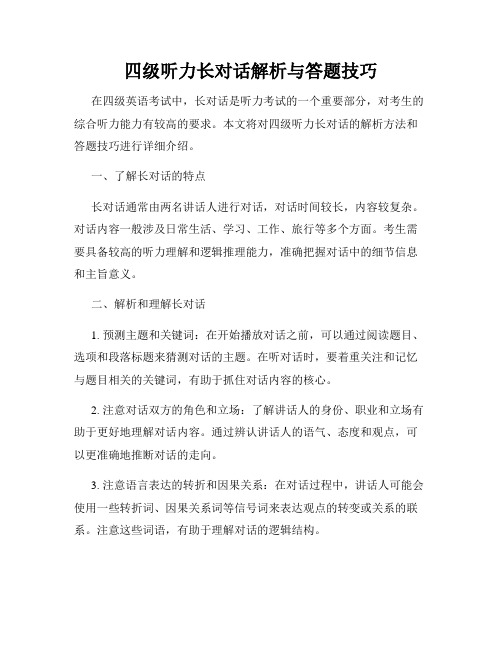
四级听力长对话解析与答题技巧在四级英语考试中,长对话是听力考试的一个重要部分,对考生的综合听力能力有较高的要求。
本文将对四级听力长对话的解析方法和答题技巧进行详细介绍。
一、了解长对话的特点长对话通常由两名讲话人进行对话,对话时间较长,内容较复杂。
对话内容一般涉及日常生活、学习、工作、旅行等多个方面。
考生需要具备较高的听力理解和逻辑推理能力,准确把握对话中的细节信息和主旨意义。
二、解析和理解长对话1. 预测主题和关键词:在开始播放对话之前,可以通过阅读题目、选项和段落标题来猜测对话的主题。
在听对话时,要着重关注和记忆与题目相关的关键词,有助于抓住对话内容的核心。
2. 注意对话双方的角色和立场:了解讲话人的身份、职业和立场有助于更好地理解对话内容。
通过辨认讲话人的语气、态度和观点,可以更准确地推断对话的走向。
3. 注意语言表达的转折和因果关系:在对话过程中,讲话人可能会使用一些转折词、因果关系词等信号词来表达观点的转变或关系的联系。
注意这些词语,有助于理解对话的逻辑结构。
4. 从上下文推测词义:遇到生词或不熟悉的表达时,可以通过上下文的逻辑关系推测其意义。
理解对话中的词汇对正确回答问题非常重要。
三、答题技巧1. 仔细阅读问题:在听对话之前,先仔细阅读题目和选项。
了解问题的要求和所需信息,有针对性地听取相关内容。
同时,要注意选项中的同义词替换和干扰信息,避免选错。
2. 避免过度依赖选项:听力考试中的选项可能是重组、改写或简化过的对话内容,不一定完全符合原词原句。
因此,切勿过度依赖选项,要以原文为准。
3. 多练习提高听力速度:通过多做模拟题和考前训练,提高听力速度和准确度。
训练中可以使用各种练习材料,例如听力练习软件、真题试卷等。
4. 注意时间管理:长对话的时间较长,考生要学会合理分配时间。
在听对话过程中,根据题目难易程度和关注度,合理决定是否跳过某题或先答后面的题目。
四、总结在四级听力长对话部分,考生需层层把握关键信息,理解讲话人的立场和观点,善于捕捉语言表达的逻辑关系和关键词。
听力长对话与短文解析与答题技巧
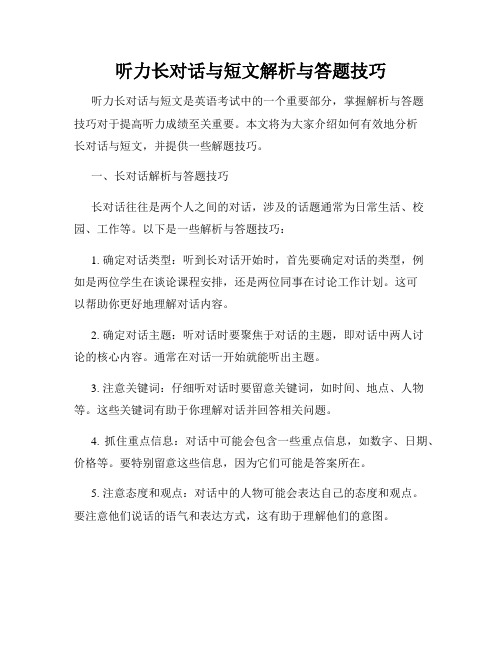
听力长对话与短文解析与答题技巧听力长对话与短文是英语考试中的一个重要部分,掌握解析与答题技巧对于提高听力成绩至关重要。
本文将为大家介绍如何有效地分析长对话与短文,并提供一些解题技巧。
一、长对话解析与答题技巧长对话往往是两个人之间的对话,涉及的话题通常为日常生活、校园、工作等。
以下是一些解析与答题技巧:1. 确定对话类型:听到长对话开始时,首先要确定对话的类型,例如是两位学生在谈论课程安排,还是两位同事在讨论工作计划。
这可以帮助你更好地理解对话内容。
2. 确定对话主题:听对话时要聚焦于对话的主题,即对话中两人讨论的核心内容。
通常在对话一开始就能听出主题。
3. 注意关键词:仔细听对话时要留意关键词,如时间、地点、人物等。
这些关键词有助于你理解对话并回答相关问题。
4. 抓住重点信息:对话中可能会包含一些重点信息,如数字、日期、价格等。
要特别留意这些信息,因为它们可能是答案所在。
5. 注意态度和观点:对话中的人物可能会表达自己的态度和观点。
要注意他们说话的语气和表达方式,这有助于理解他们的意图。
6. 多练习听力材料:多做听力练习是提高听力能力的有效途径。
可以选择一些真实的听力材料进行练习,以熟悉不同类型的对话和提高听力反应速度。
二、短文解析与答题技巧短文一般为一段话或者几段话的篇幅,涉及的话题范围更广,通常包括新闻、广告、公告等。
以下是一些解析与答题技巧:1. 浏览全文:在听短文之前,先快速浏览全文,了解短文的大致内容和主题,这可以帮助你更好地理解短文细节。
2. 注意开头和结尾:短文的开头和结尾通常会提到主题或者重要信息,要特别留意这些部分。
3. 注意时间和顺序:短文中可能会提及时间顺序或者事件的发生顺序,要注意抓住这些信息,以便更好地理解短文。
4. 注意关键词:和长对话一样,关键词在短文中同样重要。
要留意领域特定的词汇,如数字、名称、地点等。
5. 分清事实和观点:短文中的信息可能包括事实和观点两种。
要学会区分二者,以便准确回答相关问题。
英语四级考试听力答题技巧总结

2022英语四级考试听力答题技巧总结英语四级考试听力答题技巧总结1、短篇新闻答题技巧a:先了解新闻内容再去听新闻都具有时效性,因此就相关的内容进行搜索以自己熟悉的语言先大致了解新闻内容,通过对题目的预读大体了解新闻的内容。
b:养成良好的听力习惯大家不要因为一个词或者一个句子没有听懂而中断后续的思路,如果这样的听力习惯会导致整个内容的混乱与丢失。
因此切记不要在没有听懂的地方过于纠结与停留,因为一点内容没有听懂不会影响到整个*内容的听不懂,我们要学会抓大放小,学会放弃。
听不懂的地方整个听完后再回去反复听,要弄明白没有听懂的原因,可能是某个单词不认识;某个专业术语意思理解偏差;某个语法不明白导致句子意思无法理解;或者语速加快导致的;又或者是自己的不专心。
c:不要在乎特别难懂的人名或地名新闻中往往会涉及过多的人名或地名,我们在平时练习时不用过多识记,在考试中也不用被这些次要词妨碍,比如在某国家某小镇发生的爆炸事件,其中关键性的内容是爆炸事件,而发生的地点则不影响内容,在题目中也不会问及这些关于国家地点的问题。
d:尽快锁定大致内容抓住主题词新闻的主旨往往在首句处,因此前边内容要认真听清楚,往往一句话概括出内容,后边都是细节介绍。
所以要尽快地抓住*主旨。
主旨句往往含有内容关键词,比如bus explosion/US election race等等。
当然也会有Now in sports(现在进入体育新闻)....../Turn to the Middle East(现在转向中东地区)......等简单的呈现方式。
2、长对话的答题技巧两个长对话,长对话的答案一般也是从上面短对话的几个方面去考虑得出答案。
要注意的是,有时候同一个长对话里的不同问题,答案可能从不同的方面得出。
做这部分试题的时候,要注意以下几点:听音前,预读选项尽可能地把3或者4道试题的选项浏览一遍,根据选项猜测可能出现的问题及提问方式。
听音时,迅速抓住与选项及所猜测问题有关的关键词,速记有关内容或者在选项后面做记号,在有可能成为答案的选项后面做记号,在绝对没有可能成为答案的选项后面做记号,当然两种记号肯定应该不一样。
大学英语四级考试听力技巧
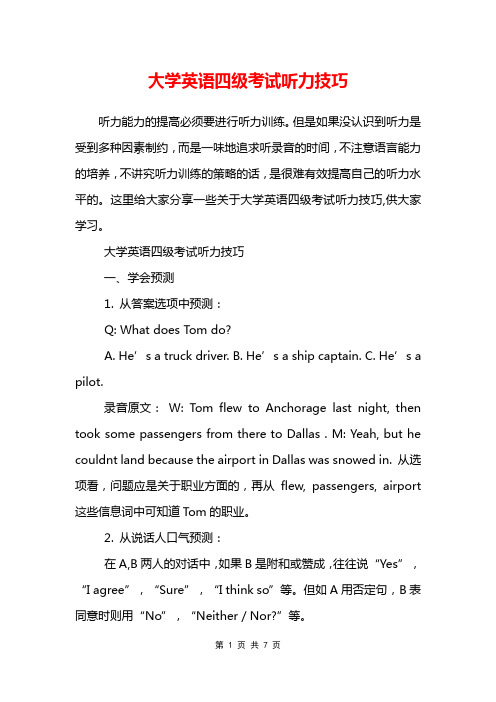
大学英语四级考试听力技巧听力能力的提高必须要进行听力训练。
但是如果没认识到听力是受到多种因素制约,而是一味地追求听录音的时间,不注意语言能力的培养,不讲究听力训练的策略的话,是很难有效提高自己的听力水平的。
这里给大家分享一些关于大学英语四级考试听力技巧,供大家学习。
大学英语四级考试听力技巧一、学会预测1. 从答案选项中预测:Q: What does Tom do?A. He’s a truck driver.B. He’s a ship captain.C. He’s a pilot.录音原文:W: Tom flew to Anchorage last night, then took some passengers from there to Dallas . M: Yeah, but he couldnt land because the airport in Dallas was snowed in. 从选项看,问题应是关于职业方面的,再从flew, passengers, airport 这些信息词中可知道Tom的职业。
2. 从说话人口气预测:在A,B两人的对话中,如果B是附和或赞成,往往说“Yes”,“I agree”,“Sure”,“I think so”等。
但如A用否定句,B表同意时则用“No”,“Neither / Nor?”等。
例如:A: Harvey doesnt seem to fit into this class. B: No, he is really a fish out of water.二、做简要笔记例:How much will the man pay for the tickets?A.$18B. $24C. $30原文:W: Tickets for the movie are $ 6 for adults, half price for children. M: All right, I’d like three tickets for adults and two tickets for children, please. 笔记可简化为:$ 6 AA代表adult,C代表children,3A+2C或6 A3+ half C2三、听清数据在获取时间信息时,不要误把会话中提到的时间简单确定为问题的答案。
四级考试听力技巧
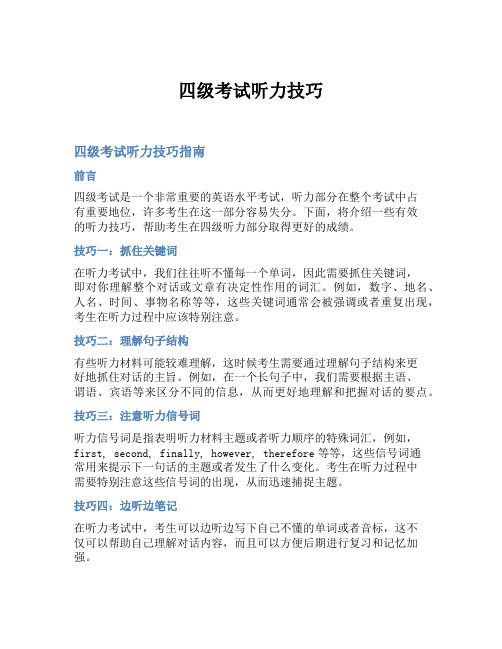
四级考试听力技巧四级考试听力技巧指南前言四级考试是一个非常重要的英语水平考试,听力部分在整个考试中占有重要地位,许多考生在这一部分容易失分。
下面,将介绍一些有效的听力技巧,帮助考生在四级听力部分取得更好的成绩。
技巧一:抓住关键词在听力考试中,我们往往听不懂每一个单词,因此需要抓住关键词,即对你理解整个对话或文章有决定性作用的词汇。
例如,数字、地名、人名、时间、事物名称等等,这些关键词通常会被强调或者重复出现,考生在听力过程中应该特别注意。
技巧二:理解句子结构有些听力材料可能较难理解,这时候考生需要通过理解句子结构来更好地抓住对话的主旨。
例如,在一个长句子中,我们需要根据主语、谓语、宾语等来区分不同的信息,从而更好地理解和把握对话的要点。
技巧三:注意听力信号词听力信号词是指表明听力材料主题或者听力顺序的特殊词汇,例如,first, second, finally, however, therefore等等,这些信号词通常用来提示下一句话的主题或者发生了什么变化。
考生在听力过程中需要特别注意这些信号词的出现,从而迅速捕捉主题。
技巧四:边听边笔记在听力考试中,考生可以边听边写下自己不懂的单词或者音标,这不仅可以帮助自己理解对话内容,而且可以方便后期进行复习和记忆加强。
技巧五:多练习最后一个技巧就是多练习了。
只有通过不断地练习,我们才能更好地掌握听力技巧并且逐渐提高我们的英语水平。
可以通过听力练习软件、听力材料集锦或者辅导班等方式进行练习。
结语以上就是四级考试中听力部分的技巧指南,希望考生可以在考试中顺利发挥并且取得好成绩。
提醒一下,除了听力部分,多听英语歌、看英语电影、阅读英文文章等外,对于四级整体水平也会有很大帮助。
注意事项除了以上的技巧,考生在考试过程中还需要注意一些事项,这些事项可能会影响考试成绩。
以下是一些值得注意的事项:1.注意听力材料开始前和结束后的提示语,这些提示语可能会包含重要的考试指导和注意事项。
大学考英语四级听力技巧
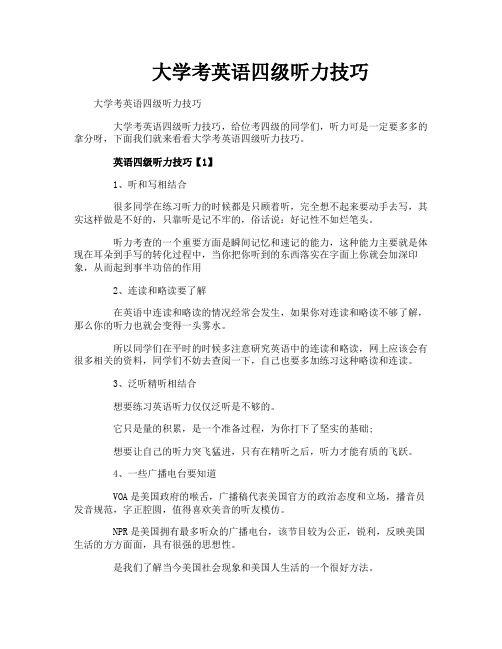
大学考英语四级听力技巧大学考英语四级听力技巧大学考英语四级听力技巧,给位考四级的同学们,听力可是一定要多多的拿分呀,下面我们就来看看大学考英语四级听力技巧。
英语四级听力技巧【1】1、听和写相结合很多同学在练习听力的时候都是只顾着听,完全想不起来要动手去写,其实这样做是不好的,只靠听是记不牢的,俗话说:好记性不如烂笔头。
听力考查的一个重要方面是瞬间记忆和速记的能力,这种能力主要就是体现在耳朵到手写的转化过程中,当你把你听到的东西落实在字面上你就会加深印象,从而起到事半功倍的作用2、连读和略读要了解在英语中连读和略读的情况经常会发生,如果你对连读和略读不够了解,那么你的听力也就会变得一头雾水。
所以同学们在平时的时候多注意研究英语中的连读和略读,网上应该会有很多相关的资料,同学们不妨去查阅一下,自己也要多加练习这种略读和连读。
3、泛听精听相结合想要练习英语听力仅仅泛听是不够的。
它只是量的积累,是一个准备过程,为你打下了坚实的基础;想要让自己的听力突飞猛进,只有在精听之后,听力才能有质的飞跃。
4、一些广播电台要知道VOA是美国政府的喉舌,广播稿代表美国官方的政治态度和立场,播音员发音规范,字正腔圆,值得喜欢美音的听友模仿。
NPR是美国拥有最多听众的广播电台,该节目较为公正,锐利,反映美国生活的方方面面,具有很强的思想性。
是我们了解当今美国社会现象和美国人生活的一个很好方法。
BBC在相当程度上代表了英国政府的政治态度,但是BBC特有的运作模式,保其独立于英国政府之外,享有较强的编辑自主权。
自开播以来,在世界上赢得了大量的听众,是世界上最多人收听的广播电台。
广播稿写作严谨,工整,惜墨如金,非常值得大家学习。
大学考英语四级听力技巧【2】听力开始前,快速浏览问题和答案1. 很多人喜欢划关键词,这会有点耗时,对于简单短句的问题和答案,能不划就不划。
2. 对于长句问题和答案,适当划关键词。
3. 提前快速阅读,能够判断听力的大概内容主题,这样能帮助更好理解。
大学英语四级听力中的长对话篇有什么好的解题技巧吗?
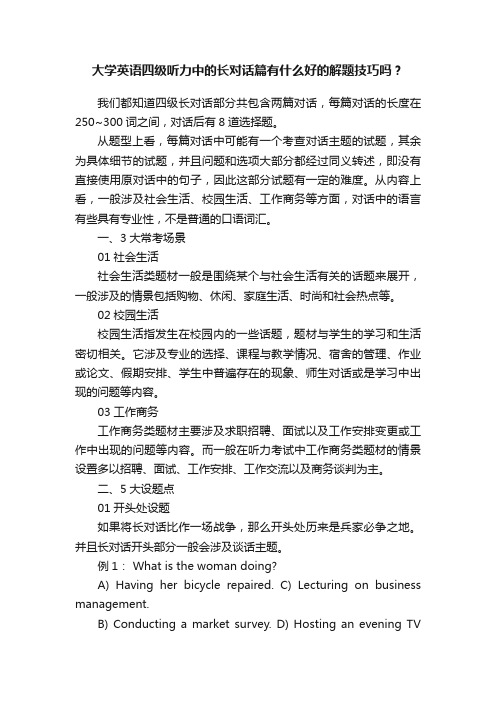
大学英语四级听力中的长对话篇有什么好的解题技巧吗?我们都知道四级长对话部分共包含两篇对话,每篇对话的长度在250~300词之间,对话后有8道选择题。
从题型上看,每篇对话中可能有一个考查对话主题的试题,其余为具体细节的试题,并且问题和选项大部分都经过同义转述,即没有直接使用原对话中的句子,因此这部分试题有一定的难度。
从内容上看,一般涉及社会生活、校园生活、工作商务等方面,对话中的语言有些具有专业性,不是普通的口语词汇。
一、3大常考场景01社会生活社会生活类题材一般是围绕某个与社会生活有关的话题来展开,一般涉及的情景包括购物、休闲、家庭生活、时尚和社会热点等。
02校园生活校园生活指发生在校园内的一些话题,题材与学生的学习和生活密切相关。
它涉及专业的选择、课程与教学情况、宿舍的管理、作业或论文、假期安排、学生中普遍存在的现象、师生对话或是学习中出现的问题等内容。
03工作商务工作商务类题材主要涉及求职招聘、面试以及工作安排变更或工作中出现的问题等内容。
而一般在听力考试中工作商务类题材的情景设置多以招聘、面试、工作安排、工作交流以及商务谈判为主。
二、5大设题点01开头处设题如果将长对话比作一场战争,那么开头处历来是兵家必争之地。
并且长对话开头部分一般会涉及谈话主题。
例1: What is the woman doing?A) Having her bicycle repaired. C) Lecturing on business management.B) Conducting a market survey. D) Hosting an evening TVprogram.原文:W: Good evening, and welcome to this week’s Business World, the program for and about business people. Tonight, we have Mr. Steven Kayne, who has just taken over and established a bicycle shop. T ell us, Mr. Kayne, what made you want to run your own store?答案:D)。
四级真题分析听力长对话技巧
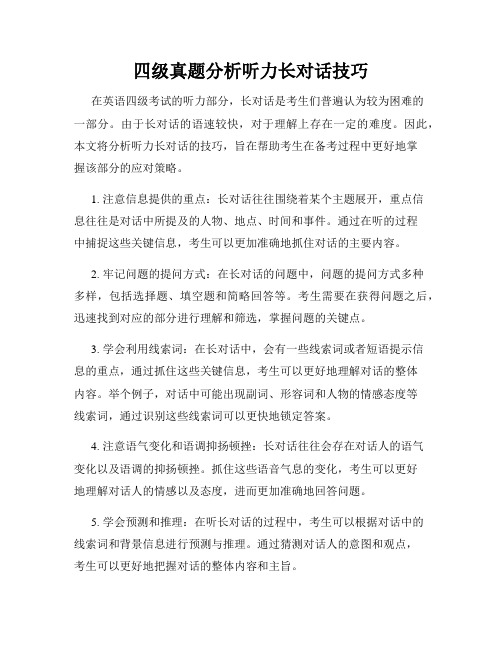
四级真题分析听力长对话技巧在英语四级考试的听力部分,长对话是考生们普遍认为较为困难的一部分。
由于长对话的语速较快,对于理解上存在一定的难度。
因此,本文将分析听力长对话的技巧,旨在帮助考生在备考过程中更好地掌握该部分的应对策略。
1. 注意信息提供的重点:长对话往往围绕着某个主题展开,重点信息往往是对话中所提及的人物、地点、时间和事件。
通过在听的过程中捕捉这些关键信息,考生可以更加准确地抓住对话的主要内容。
2. 牢记问题的提问方式:在长对话的问题中,问题的提问方式多种多样,包括选择题、填空题和简略回答等。
考生需要在获得问题之后,迅速找到对应的部分进行理解和筛选,掌握问题的关键点。
3. 学会利用线索词:在长对话中,会有一些线索词或者短语提示信息的重点,通过抓住这些关键信息,考生可以更好地理解对话的整体内容。
举个例子,对话中可能出现副词、形容词和人物的情感态度等线索词,通过识别这些线索词可以更快地锁定答案。
4. 注意语气变化和语调抑扬顿挫:长对话往往会存在对话人的语气变化以及语调的抑扬顿挫。
抓住这些语音气息的变化,考生可以更好地理解对话人的情感以及态度,进而更加准确地回答问题。
5. 学会预测和推理:在听长对话的过程中,考生可以根据对话中的线索词和背景信息进行预测与推理。
通过猜测对话人的意图和观点,考生可以更好地把握对话的整体内容和主旨。
6. 多做真题训练:最后,为了更好地掌握长对话部分,考生需要进行大量的真题练习。
通过反复练习,考生可以逐步熟悉长对话的表达方式和内容,提高听力水平和答题效率。
总之,通过以上的技巧,考生可以更好地应对四级真题听力长对话部分,提高听力理解能力和答题准确度。
在备考过程中,坚持练习和积累经验是十分重要的。
祝愿所有考生能够取得优异的成绩!。
听力长对话解析与答题技巧

听力长对话解析与答题技巧在英语听力考试中,长对话是考生们常常遇到的一种题型。
长对话通常由两个人进行真实或虚构的对话组成,涵盖了各种日常情景和话题。
掌握听力长对话解析与答题技巧,对于提高听力成绩至关重要。
本文将介绍一些有效的听力长对话解析与答题技巧,帮助读者在考试中更好地应对这一题型。
1. 重点关注话题长对话涵盖的话题广泛,可能涉及学校生活、旅行、工作、购物等。
在听长对话之前,应该提前预习相关话题的词汇和常见表达,掌握相关背景信息能够帮助我们更好地理解对话内容。
2. 注意对话人物的身份和关系在长对话中,通常会给出对话人物的身份和关系背景信息。
正确理解对话人物之间的关系对于解答问题非常重要。
要留意对话中的代词和指示词,如he, she, they, this等,从中推测出对话人物的身份和关系。
3. 着重抓主题句和信息句在听对话时,要紧紧抓住主题句和信息句,重点关注与问题相关的内容。
主题句通常出现在对话的开头或结尾,它能够给出对话的主要内容。
而信息句则提供了细节和支持信息,有助于回答具体问题。
注意听取被提问的问题和关键词,结合主题句和信息句,寻找与问题相关的回答内容。
4. 注意非语言信息除了语言表达外,对话中还存在着大量的非语言信息,如语气、语调、表情、姿势等。
这些非语言信息可以给我们提供更多的线索,帮助我们更好地理解对话内容。
要善于捕捉和理解这些非语言信息,结合语言信息进行综合分析。
5. 综合信息进行推断在长对话中,有时并不会直接给出问题的答案,需要通过综合对话内容进行推断。
在推断过程中,要结合对话中的重要词汇、上下文语境以及个人常识进行分析。
通过推断和判断,找出与问题相关的内容。
6. 注意时间和数字信息长对话中经常涉及到时间和数字信息,如日期、时间、费用等。
这些信息往往是问题的关键,但同时也是考点和干扰项。
要仔细听取对话中的时间和数字信息,将其与问题进行对比和校准,避免被干扰项所迷惑。
7. 利用笔记和图表辅助理解在听长对话时,可以利用笔记和图表辅助理解和整理信息。
大学英语四级听力测试的解题技巧

i s t h e c o n v e r s a t i o n mo s t p r o b a b l y t a k i n g p l a c e ?Wh e r e i s t h e ma n /
t h e ma n / w o ma n me a n / i mp l y ? Wh a t c a n w e l e a r n / i n f e r f r o m t h e c o n v e r s a t i o n ? Wh a t c a n b e i n f e r r e d / c o n c l u d e d ro f m t h e c o n v e r — s a t i o n ? Wh a t d o we l e a n r ro f m t h e ma n’ s / w o ma n’ S r e s p o n s e ?
3 . 主 旨题 这 类 问 题 主 要 出 现 在 长 对 话 和 短 文 理 解 中 ,主要 考 查 对 谈 话 或 文章 的 主 旨大 意或 所谈 论 话 题 的理 解 。 在长对话 中, 一
般 来说 , 该类试题 比较简单 , 只要捕 捉到对话 中的关键 词 , 就 能 立 即 判 断 出对 话 谈 论 的 内容 。 短 文 理解 一般 会 开 门见 山 , 把 中 心思 想 置 于文 章 的 开头 或结 尾 。 另外 , 我 们 还 应 特 别 注 意 文 中 反 复 出现 的 同 一词 汇 或 同 一 类 词 汇 .这 些 词 汇往 往 能 较 好 地 体 现 中心 思 想 。 常见的提问形式有 : Wh a t a r e t h e s p e a k e r ( s )
英语四级听力十大答题技巧
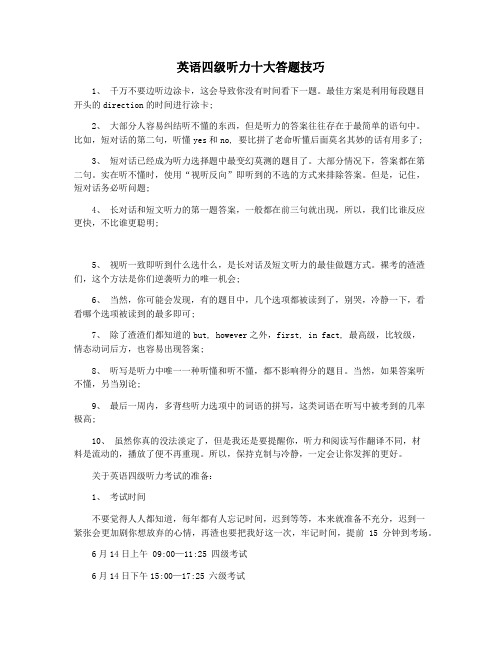
英语四级听力十大答题技巧1、千万不要边听边涂卡,这会导致你没有时间看下一题。
最佳方案是利用每段题目开头的direction的时间进行涂卡;2、大部分人容易纠结听不懂的东西,但是听力的答案往往存在于最简单的语句中。
比如,短对话的第二句,听懂yes和no, 要比拼了老命听懂后面莫名其妙的话有用多了;3、短对话已经成为听力选择题中最变幻莫测的题目了。
大部分情况下,答案都在第二句。
实在听不懂时,使用“视听反向”即听到的不选的方式来排除答案。
但是,记住,短对话务必听问题;4、长对话和短文听力的第一题答案,一般都在前三句就出现,所以,我们比谁反应更快,不比谁更聪明;5、视听一致即听到什么选什么,是长对话及短文听力的最佳做题方式。
裸考的渣渣们,这个方法是你们逆袭听力的唯一机会;6、当然,你可能会发现,有的题目中,几个选项都被读到了,别哭,冷静一下,看看哪个选项被读到的最多即可;7、除了渣渣们都知道的but, however之外,first, in fact, 最高级,比较级,情态动词后方,也容易出现答案;8、听写是听力中唯一一种听懂和听不懂,都不影响得分的题目。
当然,如果答案听不懂,另当别论;9、最后一周内,多背些听力选项中的词语的拼写,这类词语在听写中被考到的几率极高;10、虽然你真的没法淡定了,但是我还是要提醒你,听力和阅读写作翻译不同,材料是流动的,播放了便不再重现。
所以,保持克制与冷静,一定会让你发挥的更好。
关于英语四级听力考试的准备:1、考试时间不要觉得人人都知道,每年都有人忘记时间,迟到等等,本来就准备不充分,迟到一紧张会更加剧你想放弃的心情,再渣也要把我好这一次,牢记时间,提前15分钟到考场。
6月14日上午 09:00—11:25 四级考试6月14日下午15:00—17:25 六级考试2、考场路线最好提前一天现场勘查,即使懒得去,那也一定要搞清楚路线,哪栋楼,哪个教室,大概要花多长时间走到,不要觉得可能是学校天天都走熟的不能再熟,万一当天施工、这那啥的,考前稍微上点心就能避免的,没必要因为小事闹心影响本来就不怎么样的考试心情。
英语四级听力长对话解题技巧
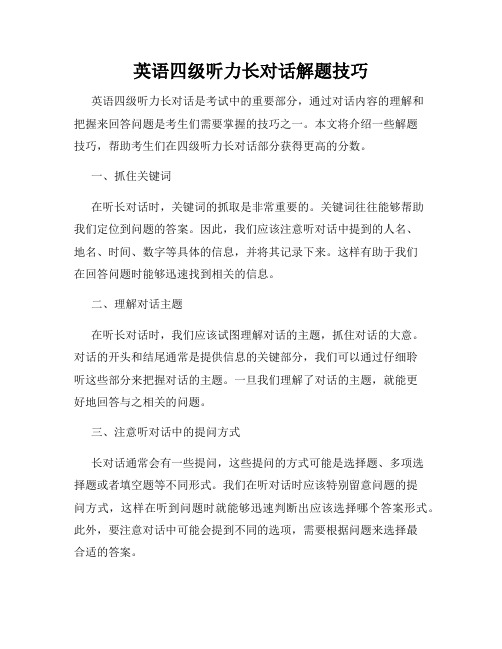
英语四级听力长对话解题技巧英语四级听力长对话是考试中的重要部分,通过对话内容的理解和把握来回答问题是考生们需要掌握的技巧之一。
本文将介绍一些解题技巧,帮助考生们在四级听力长对话部分获得更高的分数。
一、抓住关键词在听长对话时,关键词的抓取是非常重要的。
关键词往往能够帮助我们定位到问题的答案。
因此,我们应该注意听对话中提到的人名、地名、时间、数字等具体的信息,并将其记录下来。
这样有助于我们在回答问题时能够迅速找到相关的信息。
二、理解对话主题在听长对话时,我们应该试图理解对话的主题,抓住对话的大意。
对话的开头和结尾通常是提供信息的关键部分,我们可以通过仔细聆听这些部分来把握对话的主题。
一旦我们理解了对话的主题,就能更好地回答与之相关的问题。
三、注意听对话中的提问方式长对话通常会有一些提问,这些提问的方式可能是选择题、多项选择题或者填空题等不同形式。
我们在听对话时应该特别留意问题的提问方式,这样在听到问题时就能够迅速判断出应该选择哪个答案形式。
此外,要注意对话中可能会提到不同的选项,需要根据问题来选择最合适的答案。
四、利用上下文信息在听长对话时,我们可以利用对话中提供的上下文信息来理解对话内容。
有时候,对话中的某些句子可能不太容易理解,但通过上下文的线索,我们可以推断出这些句子的意思。
因此,要善于充分利用上下文信息来帮助我们理解对话的细节和推断出正确的答案。
五、多听多练英语四级听力长对话的解题技巧需要通过多听多练来掌握。
通过多次听长对话,我们能够熟悉对话的形式和题型,提高对话内容的理解和把握能力。
可以选择一些模拟题来进行练习,这样能够更好地了解自己在听长对话方面的薄弱点,并有针对性地进行提高。
六、注意时间管理在英语四级听力长对话部分,时间是有限的。
因此,我们要注意控制好答题的时间。
如果遇到某个问题无法立即得出答案,可以暂时跳过,继续往下听,争取在限定的时间内完成更多的题目。
然后再回过头来仔细思考这些未作答的问题,尽可能争取更多的得分机会。
英语四级听力--长对话篇
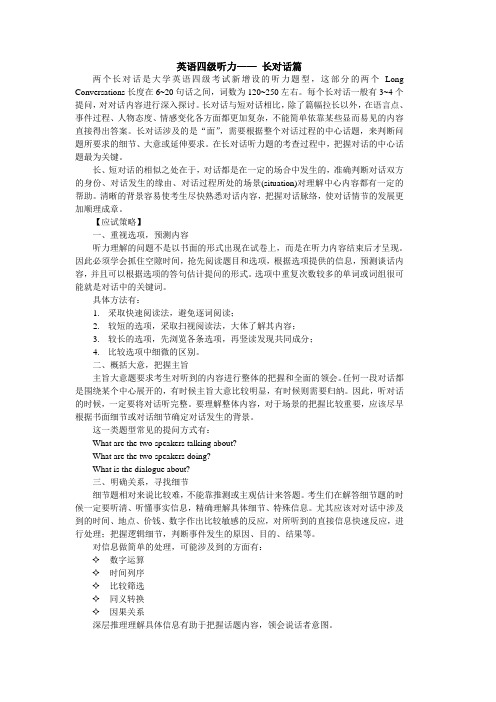
英语四级听力——长对话篇两个长对话是大学英语四级考试新增设的听力题型,这部分的两个Long Conversations长度在6~20句话之间,词数为120~250左右。
每个长对话一般有3~4个提问,对对话内容进行深入探讨。
长对话与短对话相比,除了篇幅拉长以外,在语言点、事件过程、人物态度、情感变化各方面都更加复杂,不能简单依靠某些显而易见的内容直接得出答案。
长对话涉及的是“面”,需要根据整个对话过程的中心话题,来判断问题所要求的细节、大意或延伸要求。
在长对话听力题的考查过程中,把握对话的中心话题最为关键。
长、短对话的相似之处在于,对话都是在一定的场合中发生的,准确判断对话双方的身份、对话发生的缘由、对话过程所处的场景(situation)对理解中心内容都有一定的帮助。
清晰的背景容易使考生尽快熟悉对话内容,把握对话脉络,使对话情节的发展更加顺理成章。
【应试策略】一、重视选项,预测内容听力理解的问题不是以书面的形式出现在试卷上,而是在听力内容结束后才呈现。
因此必须学会抓住空隙时间,抢先阅读题目和选项,根据选项提供的信息,预测谈话内容,并且可以根据选项的答句估计提问的形式。
选项中重复次数较多的单词或词组很可能就是对话中的关键词。
具体方法有:1.采取快速阅读法,避免逐词阅读;2.较短的选项,采取扫视阅读法,大体了解其内容;3.较长的选项,先浏览各条选项,再竖读发现共同成分;4.比较选项中细微的区别。
二、概括大意,把握主旨主旨大意题要求考生对听到的内容进行整体的把握和全面的领会。
任何一段对话都是围绕某个中心展开的,有时候主旨大意比较明显,有时候则需要归纳。
因此,听对话的时候,一定要将对话听完整。
要理解整体内容,对于场景的把握比较重要,应该尽早根据书面细节或对话细节确定对话发生的背景。
这一类题型常见的提问方式有:What are the two speakers talking about?What are the two speakers doing?What is the dialogue about?三、明确关系,寻找细节细节题相对来说比较难,不能靠推测或主观估计来答题。
大学英语四级听力技巧
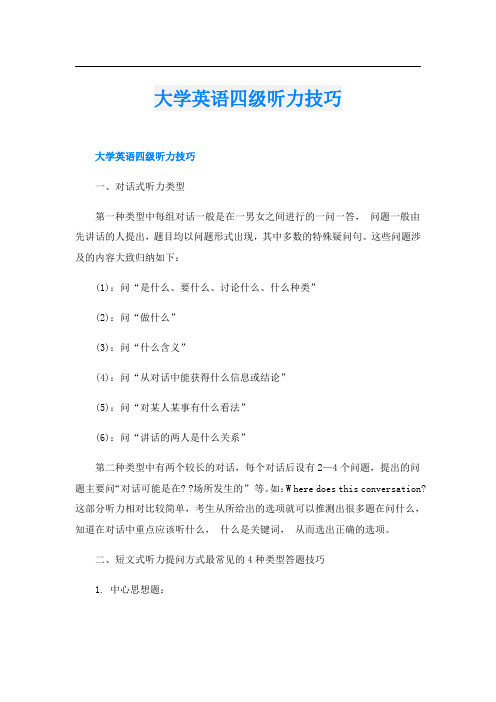
大学英语四级听力技巧大学英语四级听力技巧一、对话式听力类型第一种类型中每组对话一般是在一男女之间进行的一问一答,问题一般由先讲话的人提出,题目均以问题形式出现,其中多数的特殊疑问句。
这些问题涉及的内容大致归纳如下:(1):问“是什么、要什么、讨论什么、什么种类”(2):问“做什么”(3):问“什么含义”(4):问“从对话中能获得什么信息或结论”(5):问“对某人某事有什么看法”(6):问“讲话的两人是什么关系”第二种类型中有两个较长的对话,每个对话后设有2—4个问题,提出的问题主要问“对话可能是在? ?场所发生的”等。
如:W here does this conversation?这部分听力相对比较简单,考生从所给出的选项就可以推测出很多题在问什么,知道在对话中重点应该听什么,什么是关键词,从而选出正确的选项。
二、短文式听力提问方式最常见的4种类型答题技巧1. 中心思想题:这类问题主要是测试*的主要思想。
提问方式一般为:W hat is the passage mainly about?W hat can w e learn from this passage? What is the main:idea of the passage?等等。
集中精力听好短文开头,因为四级听力短文一般会开门见山,把中心思想置于*的开头。
2. 事实细节题考察细节包括具体时间、地点、主要人物、事件、各类数字等,问题一般为:wh—questiuon形式。
这种题型要求考生听到文中出现时间、数字时一定要特别敏感,及时做好笔记;文中一旦出现以因果连词(如:because,so,due to 等)和转折连词(如but,however,though等)引导的句子,也要格外留心,这些地方往往就是考点。
3. 对错判断题攻口:Which of the following is true/not tree,according to the passage? Which of the following is not mentioned?等等。
四级听力长对话技巧
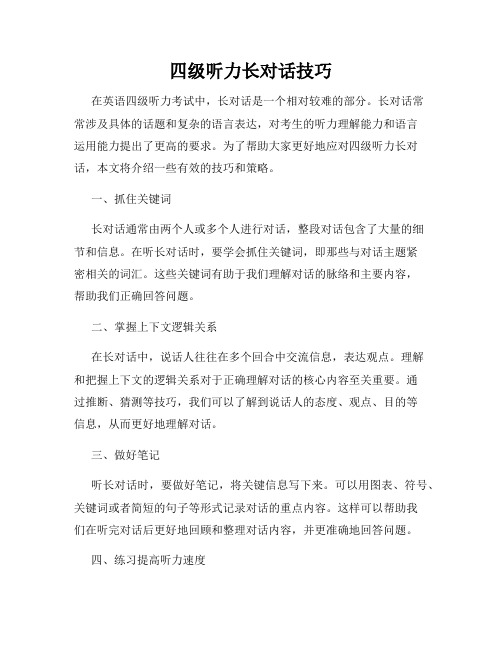
四级听力长对话技巧在英语四级听力考试中,长对话是一个相对较难的部分。
长对话常常涉及具体的话题和复杂的语言表达,对考生的听力理解能力和语言运用能力提出了更高的要求。
为了帮助大家更好地应对四级听力长对话,本文将介绍一些有效的技巧和策略。
一、抓住关键词长对话通常由两个人或多个人进行对话,整段对话包含了大量的细节和信息。
在听长对话时,要学会抓住关键词,即那些与对话主题紧密相关的词汇。
这些关键词有助于我们理解对话的脉络和主要内容,帮助我们正确回答问题。
二、掌握上下文逻辑关系在长对话中,说话人往往在多个回合中交流信息,表达观点。
理解和把握上下文的逻辑关系对于正确理解对话的核心内容至关重要。
通过推断、猜测等技巧,我们可以了解到说话人的态度、观点、目的等信息,从而更好地理解对话。
三、做好笔记听长对话时,要做好笔记,将关键信息写下来。
可以用图表、符号、关键词或者简短的句子等形式记录对话的重点内容。
这样可以帮助我们在听完对话后更好地回顾和整理对话内容,并更准确地回答问题。
四、练习提高听力速度长对话时间较长,信息量较大,考生需要具备较快的听力速度。
为了提高听力速度,可以多做听力练习,尤其是长对话的练习。
可以选择一些与四级听力类似的录音材料进行听写,提高对长对话的听写能力和听力反应速度。
五、理解说话人的意图在长对话中,说话人往往会隐含某种意图,例如表达观点、提出建议、解决问题等。
理解说话人的意图有助于我们更好地理解对话的主旨和要点。
通过分析说话人所说的话语和语气,我们可以推断他们的态度和意图,帮助我们回答相关问题。
六、积累常见话题词汇长对话的话题多种多样,以家庭、学业、社交、工作等为主要内容。
针对这些常见话题,我们应该积累相关的词汇和表达方式,以便在听长对话时更好地理解和运用。
可以通过背诵单词、模拟对话等方式进行积累和提高。
总结通过抓住关键词、掌握上下文逻辑关系、做好笔记、练习提高听力速度、理解说话人的意图以及积累常见话题词汇,我们可以在四级听力长对话中取得更好的成绩。
英语四级长对话技巧主要有哪些实用三份

英语四级长对话技巧主要有哪些实用三份英语四级长对话技巧主要有哪些 1一、各题主题揭示对话主题将各题所考查的主题内容结合在一起,往往可得出整篇对话的主题。
如果某一题目是考查对话主题,其中的一个选项明显能够概括其他各题选项的内容,那么该选项很可能为答案。
二、选项均以动词的某种形式开头含有这类选项的问题为考查“行为活动”类型。
根据动词的不同形式,问题考查的重点也可能不同。
选项均以动词原形开头,问题大多是关于建议某人做某事,有时也表示为了某种目的而要做某事。
选项均为动名词,问题大多是关于正在进行的动作或者计划打算。
选项为不定式,问题很可能是关于做某事的目的,或是计划、承诺或要求做某事。
三、选项中含有表示意愿或建议的词如果选项中含有should, had better, would like等一类的词语,问题很可能是考查“观点或建议”。
四、选项中含有表示评论或感受的动词如果选项中含有think, like, dislike, enjoy, agree, disagree, mind等一类的词语,听力材料或问题很可能是关于对某人或某事物的评价或感受。
四个选项中如均含有表示评论或感受的词,则表示问题是关于对人或事物的评价或感受;如其中只有个别选项含有表示评论或感受的词,则表示听力材料中很可能涉及到对人或事物的评价或感受,问题内容则不一定会涉及。
五、选项中含有比较结构如果选项中含有形容词或副词的比较级或最高级,或是其他表示比较的词语,则听力材料或问题很可能涉及人或事物之间的异同点或优劣的比较。
四个选项中如均含有比较级或表示比较的词,则表示问题是关于人或事物之间的比较;如其中只有个别选项中含有比较级,则表示听力材料中很可能涉及到人或事物之间的比较,问题内容则不一定会涉及。
英语四级长对话技巧主要有哪些 2一、短对话的题型大体上分为以下:1. 时间类:这类题目经常以when来__。
例如:W: Your library books are due on December 13th. If you have not finished using them by then, you may renew them once.M: Thank you very much. I only need them for a few days.Q: When must the man return his books to the library?2. 地点及场所类:经常以where__,比如问对话发生的地点。
- 1、下载文档前请自行甄别文档内容的完整性,平台不提供额外的编辑、内容补充、找答案等附加服务。
- 2、"仅部分预览"的文档,不可在线预览部分如存在完整性等问题,可反馈申请退款(可完整预览的文档不适用该条件!)。
- 3、如文档侵犯您的权益,请联系客服反馈,我们会尽快为您处理(人工客服工作时间:9:00-18:30)。
四级听力长对话的3个答题技巧
一、做好笔记,抓住细节
细节题关注对细节的把握和描述,
即要求考生在听完对话后回答以
what,when,where,how等提出
的问题。
它通常没有固定的提问方
式,问题可以涉及到对话的方方面
面,如人物的特征、事情的过程或
先后顺序、做事的喜好等。
细节题
本身并不难,但因为长对话涉及的
信息通常较多,考生在听时应在选
项旁边适时做好笔记,以应对这种
常考题型。
A.Thursday evening, from 7:00 to
9:45.
B.From September 1 to New Year’s
eve.
C.Every Monday, lasting for 12
weeks.
D.Three hours a week, 45 hours in
total.
M: Oh, I see. Well, when is it given? I hope it’s not on Thursday.
W: Well, there’s a class that meets on Monday evenings at seven.
M: Just once a week?
W: Yes. But that’s almost three hours from seven to nine forty-five.
M: Oh. Well, that’s alright. I could manage that. How many weeks does the course last?
W: Mmmm, let me see. Twelve weeks. You start the first week i n September,
and finish, oh, just before Christmas. December 21st.
Q: What do we learn about the schedule of the evening course?
二、简短回答不简单
在对话中,有时对于第一个说话人
的提问或者声明,第二个说话人的
回答会包含“简短回答+详细解说”
两部分。
其中,简短回答部分是日
常生活中最简单的口语,容易听懂;
然而后面紧跟着的解说部分则往往
较长,且可能有比较艰深的词汇,
不易听懂。
若详细解说前没有but,则解说部分是对前面简短回答的补充说明;
若详细解说前出现but,则解说部分
含义与简短回答部分相反,由此可
推出答案。
总之,第二个说话人的简短回答是其完整回答的“先遣部队”,对
理解对话、解答问题具有重要的价
值,应特别留意。
A.She finished her secondary school.
B.S he studied in a vocational college.
C.S he graduated from an open university.
D.She received full-time education
abroad
.
M: Thank you. Now, education. Which school did you go to?
W: I went to a secondary school in South Town.
M: And have you been to college?
W: No. I left full-time education, when I was 18.
Q: What formal education did the woman receive?
A.He doesn’t feel like doing it
B.He thinks it doesn’t suit him
C.It will take too much time
D.It is not funny at all
W:It’s a lovely day today! What would you like to do?
M: I really feel like doing something outdoors. Perhaps we could go hill walking?
W: Mm, I’m not really in the mood for hill walking. Why don’t we just go swimming?
M: That suits me. But it will take an hour or two. Do you like to do something else first? Maybe we could go cycling?
Q: why doesn’t the man want to go swimming?
三、抓听核心词,锁定答案
长对话的结尾处常出题,这就意味
着,抓听到结尾处的核心词,往往
能锁定答案。
因此,考生要竖起耳
朵听到最后,不可松懈。
A.It will bring her potential into full play.
B.I t will involve lots of train travel.
C.I t will enable her to improve her
Chinese.
D.It will give her more chances to visit
Japan.
M: Really, I’m interested to hear more about that, but first tell me, have you ever traveled on a luxury train, the Orient Express, for example?
W: No, I haven’t. But I’ve on the Glacier Express to Switzerland and I traveled across China by train about 8 years ago. I love train travel. That’s why I’m very interested in this job.
Q: Why is the woman applying for the new job?
A.He prefers the smaller evening classes.
B.H e has signed up for a day course.
C.H e has to work during the day.
D.He finds the evening course cheaper.
W: Do you want a day or evening
course?
M: Well, it would have to be an
evening course since I work during
the day.
Q: Why does the man choose to take an evening course?。
